
UK-based market analyst LMC Automotive has made a significant downward revision to their Western Europe car vehicle market forecast for 2012 as economic growth projections are revised down. A 5% car market decline in 2012, to 12.15m units, is now forecast.
LMC also warned that the latest market forecast does not, however, assume disorderly defaults in eurozone countries’ debts; if that were to happen, ‘a much more severe drop in the car market would be unavoidable’.

Discover B2B Marketing That Performs
Combine business intelligence and editorial excellence to reach engaged professionals across 36 leading media platforms.
A forecast car market of 12.15m units in 2012 compares with a pre-crisis market in 2007 of 14.8m – a drop of almost a fifth.
“It is looking like we are facing a difficult year in 2012 given the wider economic news coming in, the eurozone crisis still not resolved and what is happening to selling rates across the region,” said LMC analyst Jonathan Poskitt.
“A mild economic recession in Europe is looking very likely and that will inevitably mean that car markets will be depressed.”
The bottom has already fallen out of certain European car markets this year as austerity programmes are starting to take effect. In the first 11 months of this year, the Greek car market is down a whopping 32.7% on last year. In November, the Irish and Portuguese car markets were each down by almost 50% on year-ago levels.
Poskitt points out that prospects in some of the larger markets are providing cause for growing concern. “Italy and Spain are looking desperately weak,” he says. The Spanish annualised selling rate stood at 760,000 units a year last month, only just up on the October result, which was weakest rate since 1995. “The way the market has deteriorated in recent months, combined with the worsening economic outlook, means we could well see the Spanish market registering another fall in 2012 – even below this year’s depleted level.”
Italian car registrations remain worrying. The selling rate stood at 1.72m units a year last month (as did the three month average), and, like Spain, a turn around in its fortunes appears to be some time away.
The selling rate in France was 2.15m units last month, a result that Poskitt describes as ‘fairly solid’ given current developments in the region. The same can be said of the UK car market result in November, where the fleet sector provided some support.
What about the German powerhouse? Germany will be the only major European market registering any sort of gain for 2011 over 2010. Unsurprisingly, since the summer, the market’s strength has deteriorated somewhat from earlier in the year, though the full year will still be up around 10%. At 3.2m units for 2011, the market is not far from levels achieved last decade (pre-recession) though economic headwinds mean that a further improvement in 2012 is unlikely.
“The German market is losing momentum,” Poskitt maintains. “On current estimates it won’t fall far next year, but we’re currently assuming a 2% drop.”
The big questions for Europe’s outlook next year still revolve around the debt crisis for the eurozone and how that plays out. How bad could it get? LMC’s base market forecast does not assume disorderly defaults in eurozone countries’ debts. Poskitt acknowledges the uncertainties and risks. “If a disorderly default were to happen, a much more severe drop in the car market would be unavoidable,” he says. “But there’s a big range of outcomes in terms of the immediate event, its knock-on impacts – for example on the banks and liquidity generally – and the government policy responses that might follow.”
Fair enough, but what about some quantification?
Poskitt refers to the sharp drop in demand when the financial crisis and recession kicked in late 2008 and into 2009. “We saw the West European car market suddenly collapse to a running rate of around 11m units,” he says. “That gives us a guide to the kind of thing that might result if Europe’s crisis takes a sudden turn for the worse. A disorderly default in the eurozone might produce something similar if its effects weren’t contained and spread quickly into a broader regional financial crisis.”
The difference this time is that the room for national governments to mitigate a downturn via stimulus or scrappage schemes is not what it was in 2009 when governments moved quickly to stimulate demand and keep factories running.
“That’s not going to be happen to the same extent this time,” Poskitt says.
Maybe, but that doesn’t mean that the car companies won’t respond with even deeper incentives to keep sales turning over.
Trading conditions have already become tough for OEMs, with discounting of new cars sharply up in recent months as demand for cars softens in many markets across the region, not just Greece. Europe looks like being a troublesome region for automakers and suppliers alike for the next year – when comparisons with buoyant financial results this year will also be unfavourable.
The auto industry in Europe is in much better shape to weather a downturn than it was in late 2008, but pressures for further cost restructuring will increase.
One bright spot derives from the duration and depth of market weakness since late 2008. Pent-up demand ought to be building. When conditions improve, the upturn could be a surprisingly strong one. 2013 may see economic growth picking up, car buyers returning to the market. If that proves to be so, auto industry executives in Europe will no doubt be united in one simple thought: not before time.
 |
 |
 |






